For today’s installment of the Summer Blog Blast Tour, we’re thrilled to welcome back Robin LaFevers, aka R.L. LaFevers, author of a plethora of enjoyably adventuresome books for MG and YA readers, including the Theodosia series, the Nathaniel Fludd: Beastologist books, and the recent YA release Grave Mercy, which has its own absolutely drop-dead gorgeous website. We love her for her books, but also because she is a writing and blogging bud and a kindred spirit, whose advice we have repeatedly sought and appreciated via the blog she shares with Mary Hershey, Shrinking Violet Promotions.
Back in 2008, we talked to Robin about the Theodosia books for that year’s SBBT. We were so pleased that she agreed to answer our questions about her latest book release for young adults. Read on to find out the story behind the story for this intriguing historical fantasy adventure.
FW: What initially attracted you to this time and place–medieval Brittany–as a setting for your novel?
RLL: You know, I just started getting this itch, this desire to write a great big, sweeping, epic romance. Not just in the boy meets girl sense, but in the tradition of the medieval tales that told of knights and chivalry, hard choices, and lives and kingdoms lost.
And then I thought, nah. You can’t write that kind of book for teens. But the idea stayed with me and wouldn’t leave. So just on a lark, I let myself start noodling around, researching the middle ages and different countries and milieus that might make an interesting backdrop for such a story. When I learned about Anne of Brittany, something clicked and I realized that maybe, just maybe, this might work. After all, the middle ages were a very young society—teens held positions of power and were making major life decisions. That might be the exactly right place to set a book with teens front and center.
Then the more research I did, the more I became hooked into the time and place, and the medieval elements—patron saints, the drama, the intensity—became integral to the story. I don’t think those aspects of the story would have worked as well in another time or place. That, I think, is a key to historical fiction or historical fantasy—the setting has to be so deeply woven into the story that they are inseparable.
RLL: Oh this is a hard question because I am fascinated by so much of what I stumble across in my research! However, I think one of the true shockers for me as a 21st century woman was learning that some medieval women preferred joining a convent because it would give them more freedom, independence, and autonomy than their other life choices! Being as how I think of becoming a nun one of the more limiting choices one could make, that really gave me pause and drove home just how little control of their own lives these women had.
As readers might be amazed to discover is actually true, I would have to say they might be amazed by just how much of the story was based on actual facts and historical figures. There really was a twelve year old girl who inherited one of the wealthiest duchies of its day, and she really had been promised in marriage to about half a dozen noblemen or princes, and her court was rife with betrayals and treason, many of those traitors some of those who had sworn to protect and serve her.
FW: Speaking of Breton independence, did you actually travel to visit modern-day Brittany in order to research the book? (Please say you did…) What was your favorite part?
RLL: I’m so sorry to have to crush your hopes, but no. I did not travel to Brittany, although I would love to. If I sell enough books, that’s definitely on the top of my wish list! There are so many well-preserved medieval cities and towns there, just thinking about them make me start to drool.
It was pretty squee-worthy to read Nuns Behaving Badly in the NY Times in April. Was that your first NYT review? We read your Writer Unboxed piece on taking risks leading you to great rewards. Is there anything that you feel changed in your writing or your style which has turned this corner for you? Or is it entirely down to a riskier writing choice? What do you think was making you hold back?
RLL: Yes, that was my first ever NYT review! And yes, it was a totally squee worthy moment.
It turns out that the Sunday Times is very hard to find in my small town. I went hunting for a copy that Sunday and couldn’t find any! But in a truly serendipitous moment, I arrived at Starbucks JUST as they were putting their last copy out. It had somehow inadvertently been left in the back by accident until just that moment. So I have a hard copy of the real live actual newspaper that I will treasure forever.
As for what changed in my writing, hmmm. I would have to say it was mostly a matter of having written a lot, and in doing that, working my way down to my core themes and stories. And it probably has to do with letting go of fear. (Isn’t it always about fear, in some way?) And the thing is, the fear never really goes away. Even now, I’m afraid that someone will laugh at the books or worse, laugh and say “Psyche! Just kidding. This book sucks and it was all an elaborate joke and we’re returning ALL THE COPIES.”
Or the second book will not live up to the first.
Or I won’t be able to pull off in the third book what I hope to try.
That’s not to say I wasn’t taking risks or trying to go deep with my earlier books. But I think it is also a process that occurs over time and with each book we write, we go a little deeper, get a little bit more used to being exposed or speaking our truth. The sky does not fall, we are not struck my lightning, nobody toilet papers our house. Life goes on. All those things we feared—even though we didn’t even realize we were afraid of anything!—begin to recede or seem less threatening.
Then other times I think it has to do with reaching middle age. I know that sounds odd, but it seems like there’s a certain amount of freedom that comes as you get older—especially for women—as our focus and energy moves away from family and our biological programming to nurture and act as social glue—we get to start really rolling up our sleeves and dig into our own work.
FW: I hope you did a happy dance in that Starbucks, and that everyone KNEW it was your book being reviewed in that paper!! Nurturing your craft and digging into your work really, really, really has paid off.
All of your novels have subtexts featuring empowered women. Theodosia wants to be taken seriously as an Egyptologist, a mature girl, and a sleuth. Aunt Phil balances her loving nature with a big dose of determined, brisk, and businesslike. Ismae struggles with her place as a 15th century woman, then as a Handmaiden who might know more than her patron God. How do you feel about being known as a “girl power” author? What other less obvious subtexts do you feel you weave in all of your books ( because we’ve all discovered that we do that, to a certain extent)?
RLL: I am wildly happy to be known as a girl power author! That totally works for me. However, maybe because I had seven brothers and raised two sons, I am also aware that not every boy child is born understanding that they have power and knowing how to wield it. I tend to think of myself as driven more by kid and teen power than by any actual gender.
And that is SUCH a good question about identifying the less obvious themes in our work, because they do crop up, whether we mean for them to or not, so best be aware and use them to the story’s advantage. Being an outsider or odd duck and finding a place to belong is definitely one I see show up time and again. Also the eternal struggle to be true to ourselves, yet please others who are important to us. That is something that has dogged me all my life and I wrestle with even today. But mostly my themes are about power because it’s something I’ve struggled with forever. I have been very blind to my own power and have often given it away by the bucketful without even realizing it. So one of the things that drives me is that voiceless child/powerless teen who was desperate to locate some small measure of power in her life.
Switching gears, let’s move to five lighter questions:
RLL: Saint Mortain was actually his name from the very beginning. I knew I wanted to have mort in the name, the French word for death, and that felt right. Few things come to me that easily. 🙂
RLL: Yes again! That first sentence was one of my original anchors into the story; it set the tone, the voice, the mood, everything I was shooting for. As for the cover, the concept was always a girl with a crossbow in front of a castle looking fierce, but the first photograph they were considering ended up not working out. Which was great because we got this perfect one instead!
RLL: I don’t bounce my books off my spouse. He always loves what I write and is not given to critical analysis where my books are concerned so he didn’t read it until it was an ARC. He loved it quite a lot, but then, he is my husband, and a dyed in the wool romantic, so . . .)(Wonderland: Awww!)
I didn’t know it had potential for big until I showed it to my agent, and she got kind excited. But that ended up being really distracting and I had to put her reaction aside and concentrate on finishing the story and not weigh it down with those external sorts of expectations. It is SO easy, once you begin thinking things like big, and market, to let those influence your story decisions and choices as opposed to having them serve the story, and I really wanted to avoid that.
RLL: You know, the best tour experience is always meeting the passionate booksellers and getting a chance to connect with teens who’ve read and loved the book. Hands down, the best part. The worst? Eh, planes that don’t have enough leg or shoulder room. And having my bra set off every metal detector on the tour. :)(Wonderland: We FEEL YOUR PAIN!!!)
RLL: That I write stories because I am fascinated by questions and interested in exploring them, not because I have all the answers—or sometimes any answer at all.
Robin, thank you, as always, for being willing to be part of our tour! We absolutely adore this series, we support your work, and we value your wisdom. Thanks again!
Don’t forget to check out the other stops on the Blog Blast Tour for today:
TeenBoat’s Dave Roman @ Bildungsroman
L. Divine @ Crazy Quilt Edi
Check out the full schedule for the week at Chasing Ray.
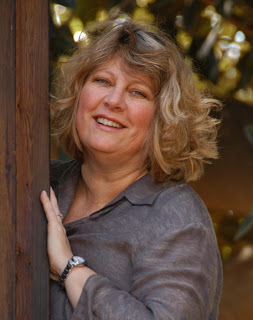
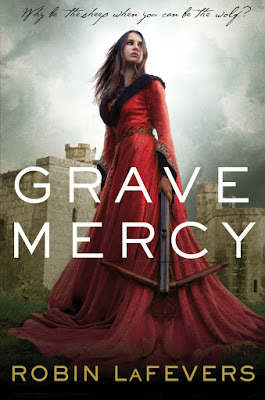
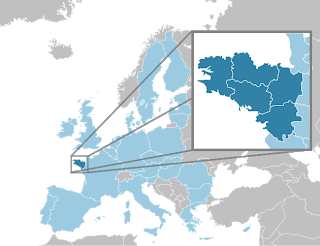
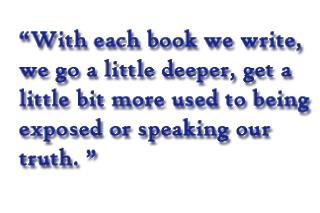
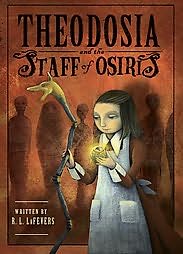
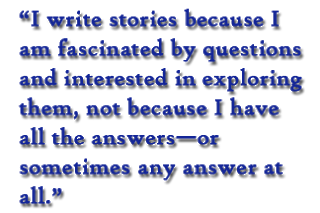

Great interview! I love medieval history, so Grave Mercy was right up my alley. I didn't know Anne was a real person, however.
So funny that you couldn't find a copy of the Times to see your review in print! I'm glad you did and I hope the tour takes you to France. It will take me to the bookstore to get a copy of Grave Mercy!
Edi
I'm going to look for Grave Mercy right now. Great interview! Thanks.